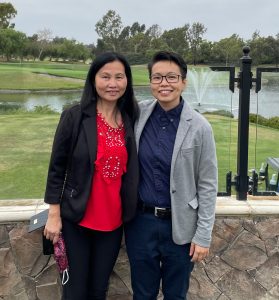by Julie Pham
Temple City, Calif.
I decided to chant for the things that I feared the most. One of them was to open my heart and life to others without the fear of rejection and disappointment.
When my best friend’s health declined in 2014, following a brain cancer diagnosis, I began to spend as much time with her as possible. She was a fierce person, always, and the diagnosis made her even fiercer. Every moment of the day she lived with a joyful, fighting spirit. One of our last conversations ended with her steady look and the words, “There’s nothing to be afraid of.”
To cope with my fears, I took up Buddhist practice, receiving the Gohonzon on June 1 that year. Just two days after, she passed away, having kindled in me not only a passion to care for the terminally ill but, at age 25, the resolve to summon my courage.
At that time, I harbored so many fears, among them, opening up to friends and family about my sexual orientation. As early as age 6, I understood that I felt something for some girls that I did not for boys. I confided only to my best friend, one of very few people with whom I felt at ease, unashamed of who I was.
My parents, first-generation immigrants from Vietnam, come from traditional backgrounds, places where people of the same sex did not couple openly. Always a tomboy, confused by the purpose of Barbie dolls, I preferred sports to playing house. As I approached my senior year of high school, my mother couldn’t help but notice that, while many of my friends had begun to have boyfriends, or at least pine for one, I myself had never once even broached the subject. It was around this time when she began commenting on same-sex couples when we saw them. Her comments told me that loving someone of the same gender was strange, probably shameful.

For years, I bottled up my attraction to girls. When I did express them—the first time as a college sophomore—it was to a young woman who, like me, was from a traditional background and, like me, was acknowledging her sexuality for the first time. Her shame surfaced in bursts of anger directed at me, which echoed my parents’ nightly fights and lashing out at me. This is love, I thought. Or rather, This is the love that I deserve; the only love I’ll ever have. I would continue to think this for many years, closing my heart and stifling my emotions. Even as I continued to over-
come many fears, among them my fear of failing to become a medical professional, my fear of rejection remained.
Part of me continued to feel ashamed of my sexuality and unworthy of love. Not until 2021 did I decide, after a painful disappointment in love, to overcome this shame and self-doubt once and for all. In September, I began to chant Nam-myoho-renge-kyo abundantly and take part wholeheartedly in SGI activities, making this a personal goal toward Nov. 18, Soka Gakkai Founding Day. Before, such disappointments had caused me deep anguish, but this time, because, as a youth leader, I was so energetically encouraging other young people—studying Nichiren Daishonin’s writings and Ikeda Sensei’s encouragement—I found myself shedding happy tears, in appreciation for every disappointment, every mistreatment that had brought me to this moment. I could feel that with every cause I made, I was prying open the door to a new chapter in my life. Quickly the opportunity arose for me to act on this inner shift, in the form of my cousin’s wedding invitation.
Discussing plans with my mother for this happy occasion, there was a pause. Without the slightest hesitation or fear, I heard myself ask, “Hey, mom, do you ever want me to get married?”
“Yeah, of course!”
Somehow, totally at ease, I ventured, “If I do get married, it’s not going to be to a man, you know?”
She was quiet for a moment. “What do you mean?”
“Well, I would want to get married to a woman!”
She didn’t react the way that I had feared. She wasn’t yelling; she wasn’t disowning me. “Well, of course that’s all right with me,” she said calmly. “I want you to be happy.”
By the way she said it, I realized that my mother had accepted this part of me some time ago and had been merely waiting for me to open up to her. I felt good, wonderful. But it was not my mother who unburdened my heart—I had already done that. Through chanting and fighting for kosen-rufu with good friends in faith, I had already realized that I was infinitely worthy of kindness, love and acceptance. Opening up to my mother was just the beginning—this inner shift invigorated my friendships old and new, and fundamentally changed the way I approach relationships in general.
Before her passing, my best friend showed me the life of a person of courage. Chanting the lion’s roar of mentor and disciple, summoning the courage to act on the guidance of my mentor, I have drawn closer than ever to her parting declaration that, for a person of courage, there is truly nothing to fear.
You are reading {{ meterCount }} of {{ meterMax }} free premium articles

